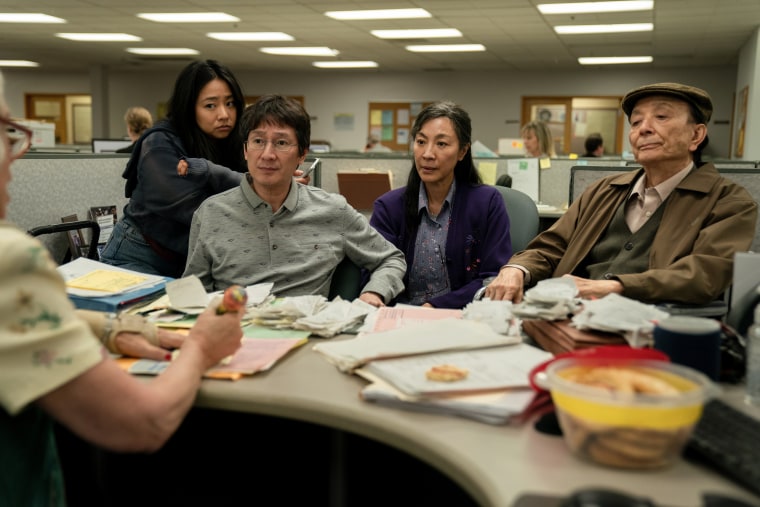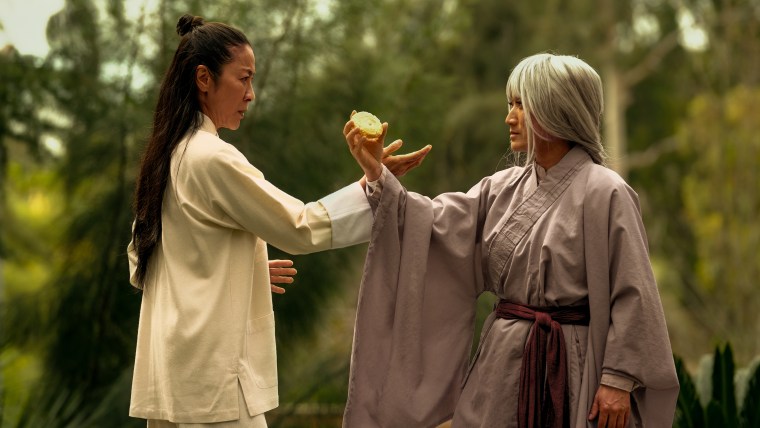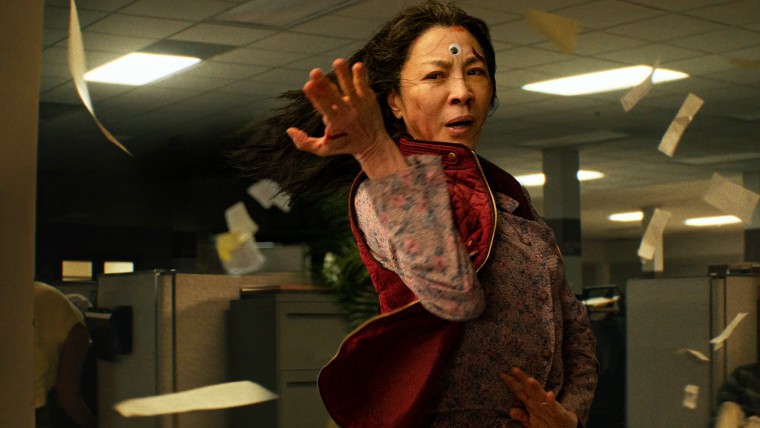Cinema veterans Michelle Yeoh and James Hong have bodies of work that span decades and continents. But it wasn’t until the new sci-fi comedy “Everything Everywhere All At Once” — featuring universes where people have hot dogs for hands and others where they find themselves in the company of deranged tax auditors — that they became the stars of a Hollywood film.
“Doors have opened much wider,” Yeoh, who was born in Malaysia, said of the movie, which premiered in a limited release last week. “This is the first time in many years, apart from the movies that I made in Asia, that I had the lead role.”
The idea is almost confounding to many Asian Americans, who have considered Yeoh and Hong two of the most significant actors in the industry. Yeoh cemented herself as an icon in the golden age of Hong Kong cinema in the 1980s before she appeared in Hollywood hits such as “Crouching Tiger, Hidden Dragon,” “Tomorrow Never Dies” and “Crazy Rich Asians.” Hong, who has almost 700 film and television credits, has appeared in classic movies like “Blade Runner” and Disney’s original “Mulan.”
Both said that despite their credentials, Hollywood gatekeepers haven’t always been eager to put their names at the top of call sheets or welcome the emergence of messy, complicated Asian stories. But Yeoh and Hong both say their prominent roles in “Everything Everywhere” — a psychedelic take on a Chinese immigrant story — aren’t by chance. They see the movie, in part, as the result of fervent advocacy and steadfast conviction in Asian artists.

“So many of us have been working on pushing the envelope and trying to make it happen, because it’s very simple,” Yeoh said. “We believe in us. We believe in our Asian talent. We believe all of us have stories that need to be told and need to be embraced.”
Hong said, “I just got out there and fought every day.”
In the movie, which is scheduled for wide release April 8, Yeoh plays Evelyn Wang, an exhausted Chinese immigrant mother who runs a collapsing laundromat business with her doting husband, Waymond, played by Ke Huy Quan of “The Goonies” fame. The family runs into tax issues, and as Evelyn tries to sort out the paperwork with the IRS, she is thrust into a massive conflict across the multiverse.
It turns out that the frazzled Evelyn is the only one who can stop the mysterious, powerful “agent of chaos” who threatens to destroy the multiverse — one that’s filled with lives she could have led had she not run off to America with Waymond, against the wishes of her father, Gong Gong, played by Hong.
The adventure, marked by absolute absurdity, unravels into a self-examination of Evelyn’s life. There are her disconnected relationship with Waymond, the aching tensions and communication struggles she has with her daughter, Joy, played by Stephanie Hsu, and the intergenerational trauma that started with Gong Gong. The movie may not read like a quintessential immigrant narrative, but it speaks to that experience in an imaginative way.
Yeoh said it honors a very familiar, “very ordinary woman” by turning Evelyn into a superhero.

“This movie for me was such an homage to so many women like that around us who are sometimes invisible, who we take for granted,” Yeoh said. “There’s so many relatable things, and all because they were chasing the American dream. … We all know that it’s so hard. I think any immigrant that comes here will tell you how difficult it is and of sometimes failing and not being able to find it.”
Yeoh said that with the incorporation of intense visuals and storylines that throw viewers into perpetual chaos, the saga is “weird, wacky and wonderful.” And in many ways, it’s exactly the sort of fulfillment she has searched for in her career. For Yeoh, who has long made a name for herself overseas, leading a Hollywood film has never been a litmus test for her success. But given the way Asian actors have often been typecast as “expressionless,” with women relegated to depicting objects of desire rather than those worthy of complex, cognitively challenging characters, the multiverse concept flatly disproves the stereotypes. It has shown that the film’s heavily Asian cast can slip into a rainbow of identities.
“It’s like I have been training for the last 30-odd years to be able to pull off this role that’s given me an incredible opportunity to showcase all the different dimensions that I believe all of our Asian actors, actresses, our talents, are so capable of, but very rarely do they find a vehicle, a script, a character that’s presented to them,” Yeoh said.
She credited the “geniuses” Daniel Kwan and Daniel Scheinert, the directors of the film professionally known as “The Daniels,” for creating that vehicle.
“I get down on my knees and thank my lucky stars that it’s been given to me at this point in my career,” she said.
Hong, 93, who is scheduled to be honored with a star on the Hollywood Walk of Fame, said he can attest to the decadeslong effort for a movie like this to be made. Hong, who has been in the industry for more than 70 years, established the East West Players with a few other Asian American artists in hope of advancing representation in theater.
“We have been known, and are still known, as a ‘silent minority,’” Hong said of Asian Americans. “How do we get out of that niche? By doing films like this one. … We will start to communicate our thoughts and feelings to the public.”
He underscored the importance of “stirring the pot,” saying he sees the fight for equity as one that is mirrored in all aspects of society, not just the arts.
“When I came back from Hong Kong at 9 years old, I was beaten up in the grade school playgrounds, because I couldn’t speak English,” Hong recalled. “From that point, I fought all the way to what I’m doing now. So I encourage all Asian Americans, all people of all different nationalities, to express yourself and do your own thing the best you can, and then things will get better as a whole.”
For now, the film, in all its oddball glory, represents somewhat like fuel for Hong to continue working. It’s a sign that all those years of fighting have paid off in tangible ways.
“I dreamt that this day would come, and it’s just beginning,” he said.
